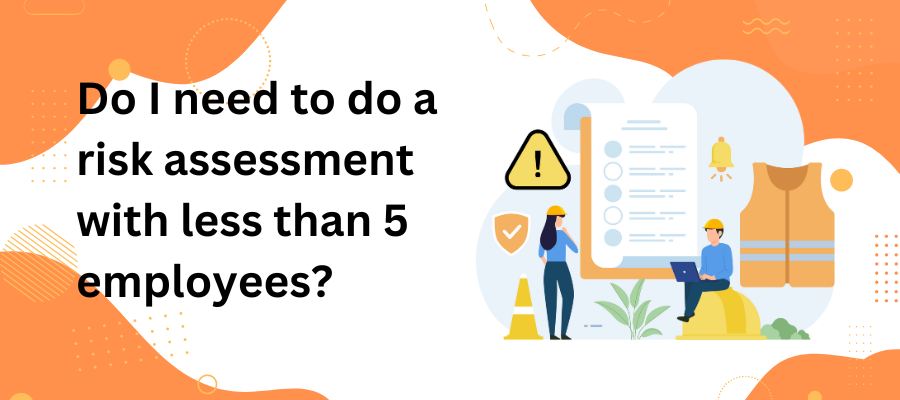In the United Kingdom, the importance of risk assessment in the workplace cannot be overstated. It is an essential step in ensuring the safety and well-being of employees, regardless of the size of the company. However, many small business owners often wonder if conducting a risk assessment is necessary when they have fewer than five employees. In this article, we will explore the concept of risk assessment, the relevant UK legislation, and the benefits of conducting a risk assessment for small businesses. We will also delve into the process of conducting a risk assessment and highlight some case studies and examples to provide a comprehensive understanding of the topic.
Understanding Risk Assessment
First and foremost, let’s establish what exactly a risk assessment is. A risk assessment is a systematic process of identifying and evaluating potential hazards or risks in the workplace. It involves assessing the likelihood and severity of these risks and taking appropriate measures to control or mitigate them. The aim is to create a safe working environment for employees, visitors, and anyone who may be affected by the business operations.
What is a Risk Assessment?
A risk assessment is a proactive approach to health and safety management. It involves identifying hazards, such as slippery floors, faulty equipment, or harmful substances, and assessing the risks associated with them. By understanding the potential risks, businesses can implement control measures to prevent accidents, injuries, or even fatalities. These measures can range from simple changes in practices and procedures to investing in safety equipment and training.
Importance of Risk Assessment in the Workplace
The importance of risk assessment in the workplace cannot be emphasized enough. It is a legal requirement under UK legislation, as outlined in the Health and Safety at Work Act 1974 and the Management of Health and Safety at Work Regulations 1999. Conducting a risk assessment helps businesses fulfill their legal obligations, but it goes beyond mere compliance. A thorough risk assessment enables businesses to identify potential hazards that may not be immediately apparent and take proactive steps to mitigate them. By doing so, businesses protect their employees, minimize the risk of accidents and injuries, and create a positive work environment.
UK Legislation on Risk Assessment
Before delving into risk assessment for small businesses, it is crucial to understand the UK legislation that governs this area. The Health and Safety at Work Act 1974 is the primary legislation that sets out the general duties of employers to ensure the health, safety, and welfare of employees and others who may be affected by their work activities. Alongside this act, the Management of Health and Safety at Work Regulations 1999 provides further guidance and sets out specific requirements for risk assessment.
Health and Safety at Work Act 1974
The Health and Safety at Work Act 1974 places a legal duty on employers to ensure the health, safety, and welfare of their employees. It also requires employers to assess the risks to the health and safety of anyone who may be affected by their work activities, which includes employees, visitors, and members of the public. This risk assessment must be recorded if the business has five or more employees.
Management of Health and Safety at Work Regulations 1999
The Management of Health and Safety at Work Regulations 1999 provide further guidance on risk assessment. These regulations specify that a risk assessment should consist of a systematic examination of work activities, the identification of hazards, an assessment of risks, the implementation of control measures, and ongoing monitoring and review. The regulations also state that the findings of the risk assessment should be recorded if the business has five or more employees.
Risk Assessment for Small Businesses
Now, let’s address the specific concerns of small business owners. The question arises: Is risk assessment mandatory for small businesses with fewer than five employees? The answer is yes, albeit with some flexibility.
Is Risk Assessment Mandatory for Small Businesses?
- Even if a small business has fewer than five employees, it is still legally obligated to conduct a risk assessment as per the Health and Safety at Work Act 1974 and the Management of Health and Safety at Work Regulations 1999.
- Even though there is no legal requirement to record the risk assessment findings, it is good practice to do so. This documentation demonstrates a commitment to health and safety and provides a reference point for future reviews or if there are any changes in the business’s operations or circumstances.
Therefore, small businesses should not overlook the importance of risk assessment, as it plays a vital role in maintaining a safe working environment for everyone involved.
Benefits of Risk Assessment for Small Businesses
Conducting a risk assessment offers numerous benefits for small businesses, including:
- Employee Safety: By identifying potential hazards and implementing control measures, small businesses can ensure the safety of their employees, reducing the risk of accidents and injuries.
- Legal Compliance: Complying with health and safety legislation is not just a moral obligation but also a legal requirement. By conducting a risk assessment, small businesses fulfill their legal obligations and protect themselves from potential legal consequences.
- Cost Savings: Preventing accidents and injuries through a risk assessment can save small businesses from significant expenses associated with compensation claims, legal penalties, and additional costs of hiring and training replacement staff.
- Reputation and Trust: Prioritizing the safety and well-being of employees enhances a small business’s reputation, both among its employees and the wider community. This fosters trust and can attract talented employees and loyal customers.
Considering these benefits, it is clear that conducting a risk assessment is a worthwhile investment for small businesses, regardless of their size.
Conducting a Risk Assessment with Less Than 5 Employees
The process of conducting a risk assessment with less than five employees is similar to that of larger businesses. However, the scale of operations and the nature of the hazards involved may differ. Here are the key steps to follow:
Identifying Potential Hazards
Start by identifying potential hazards in the workplace. This can be done through observation, consultation with employees, reviewing previous incidents, and researching industry-specific hazards. Some common hazards include slips, trips, and falls, manual handling, electrical hazards, and exposure to harmful substances.
Evaluating Risks and Implementing Control Measures
Once potential hazards have been identified, evaluate the risks associated with each hazard. Consider the likelihood and severity of potential accidents or injuries. Based on this evaluation, implement appropriate control measures to minimize or eliminate the risks. This can include engineering controls, administrative controls, or personal protective equipment. Document these control measures and ensure they are communicated to employees.
Recording and Reviewing the Risk Assessment
While there is no legal obligation to record the findings of a risk assessment for businesses with fewer than five employees, it is recommended to do so. Maintaining a record of the risk assessment demonstrates a commitment to health and safety and provides a reference point for future reviews or if there are any changes in the business’s operations or circumstances. Regularly review and update the risk assessment as necessary, taking into account any changes in the workplace or the introduction of new hazards.
Consequences of Neglecting Risk Assessment in Small Businesses
On the other hand, neglecting risk assessment can have severe consequences, both for employees and the business itself. A small restaurant that failed to conduct a risk assessment faced a situation where a customer slipped and suffered a severe injury due to a wet floor. This incident not only affected the injured customer but also tarnished the restaurant’s reputation and led to legal consequences.
In conclusion, conducting a risk assessment is essential for all businesses, regardless of their size. In the United Kingdom, even small businesses with fewer than five employees must comply with legal requirements and prioritize the safety and well-being of their employees. By understanding the concept of risk assessment, adhering to relevant legislation, and implementing proactive measures, small businesses can create a safe working environment and enjoy the numerous benefits that come with it.
See Evalu-8 EHS in action
The leading choice of EHS software for small to large companies in the manufacturing sector that want to get control of there safety



